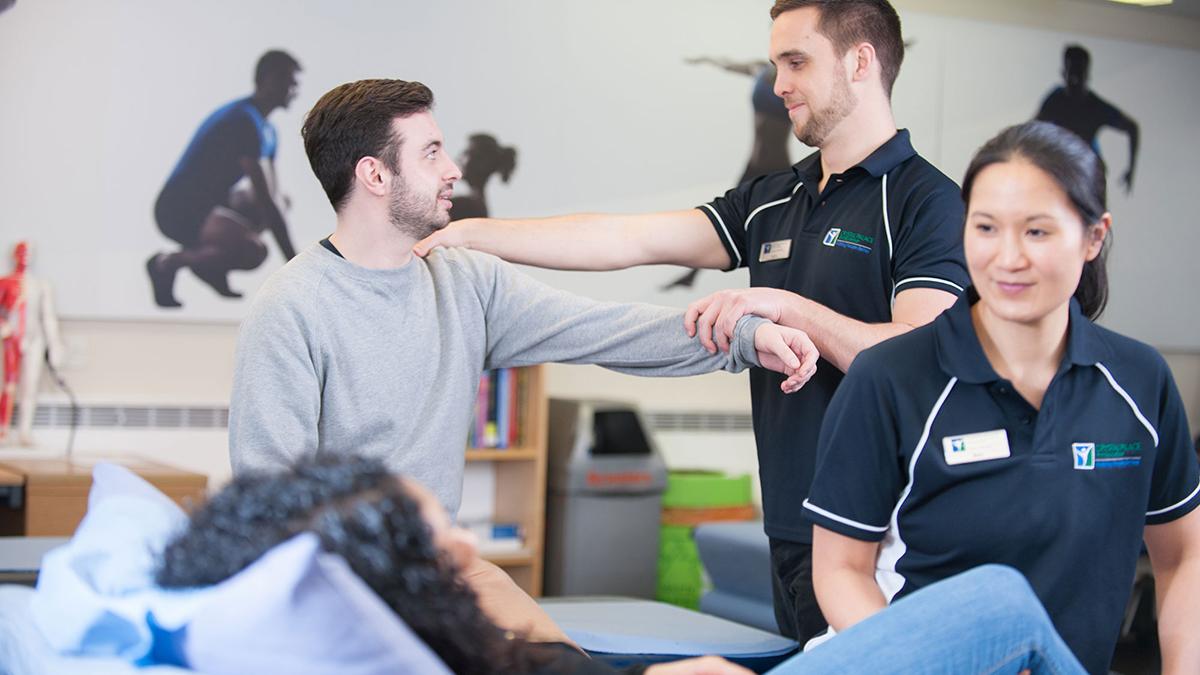There are a wide range of roles available to the holder of a physiotherapy degree.

There are a wide range of opportunities available to the holder of a physiotherapy degree. Which means you will have to decide which options are best for you. It’s important that you take the time to think about what you would like to do and how you can do it, or to plan your next steps towards getting where you want to be. It doesn’t matter which stage you’re at, the sooner you start thinking about your career, the easier it will be to find the job you want.
A physiotherapy degree opens many doors across different sectors and settings. As you go through your career, some roles require you to specialise while others will give you the opportunity to develop a breadth of skills. You’ll also have personal considerations, such as location, working patterns, and financial considerations (including whether you were funded by a bursary in Wales for example) all of which will influence what decisions you make about what job to take. It really comes down to which option works best for you.
And remember – down the line you may even choose not to practise clinically. Research, policy, management, leadership, public health, teaching roles are all common career paths for physiotherapists. It’s ok not to know where you plan to be in 5 years’ time. Your first post, wherever you work, will be a great opportunity to explore your options.
Range of fields/specialities
You’ll know through what you’ve experienced either on placement or through your lectures that there’s a range of fields to choose from. From musculoskeletal physiotherapy, paediatric, oncology and palliative care, to geriatric physiotherapy, and rehabilitation and pain management – just to name a few!
Sectors
You will also have to decide in which setting you wish to start your career. This could be in any of the following:
- The public sector: this is the part of the economy composed of both public services and public enterprises, including the NHS.
- An Independent Sector Healthcare Provider (ISHP): this is a private sector healthcare company that is contracted by the NHS in the provision of healthcare or in the support of the provision.
- The private sector: this is the part of the economy that is run by individuals and companies for profit and is not state controlled.
- The third sector: this is the part of an economy or society comprising non-governmental and non-profit-making organizations or associations, including charities, voluntary and community groups, cooperatives.
Rotations, specialising and generalists
Rotational posts provide a chance to develop broad experience, working with a range of patients and professionals in various settings. A rotation scheme will give you the opportunity to complete different rotations within a set amount of time, gaining experience in various clinical settings.
A number of NHS Trusts and organisations from the independent sector do offer static Band 5 posts – these are great for those who know where they wish to specialise.
There has also been a move towards generalist practice, with generalists now valued as much as specialists. With increasing numbers of people with long-term conditions, co-morbidities and complex needs, and a shift to out-of-hospital care, in the future more physiotherapists will need to have developed generalist skills and the capability to practise as generalist practitioners.
Julia Roth MSc MCSP, Chartered Member since 2019My placement experiences allowed me to see that I have a vast interest in many areas of physio. Therefore, a rotational post is my perfect first job as it allows me to continue to build a versatile physio ‘toolkit’ and to see where my passion really lies.
Other career paths
Teaching, research and leadership roles are other options available. Budding researchers may choose to pursue roles as research assistants or by taking up clinical academic roles. This could see you investigating new approaches or interventions and presenting findings to international audiences. If this appeals, look out for research internships (and funding) to gain valuable experience.
To find out more, connect with your regional Council for Allied Health Professions Research (CAHPR) hub and your local universities.
If you wish to continue your studies then a post-registration qualification may be for you. Options include Masters degrees, PhDs, postgraduate diplomas and certificates in subjects such as advanced physiotherapy, clinical education or specialist topics. Apply for funding from the CSP’s Charitable Trust to help finance.